During the last century we have been blessed with many exceptional violinists. Ten violinists, musical giants of the 20th Century, truly changed the world of music.
Bronislaw Huberman
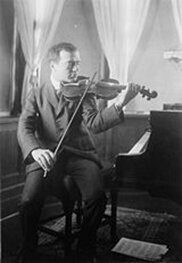
Bronisław Huberman
Legendary violinist Bronislaw Huberman was born in Poland in 1882. His extraordinary talent led to European tours as a prodigy and later he became one of the most singular soloists of the 1920s and 30s, playing a dazzling number of concerts all over the world, before the jet age. Known for his golden tone and flair, ultimately he became celebrated for his bravery as a peace activist and humanitarian.
As the Nazis rose to power, Huberman sensed the looming tragedy unfolding in Europe. Huberman recruited the support of prominent associates. He performed hundreds of benefit concerts to raise funds to save imperiled musicians and transport them and their families to Palestine. Miraculously he secured the requisite number of visas. The Palestine Philharmonic was formed. Their first triumphant concert was under the baton of Arturo Toscanini in 1936 in Tel Aviv. Huberman’s legacy beyond founding the distinguished Israel Philharmonic, was exemplifying the moral courage to save more than one thousand Jews from certain death during the Holocaust. Huberman’s effort is featured in a documentary film Orchestra of Exiles.
Édouard Lalo: Symphonie espagnole, Op. 21 (exerpts) (Bronislaw Huberman, violin; Vienna Philharmonic Orchestra; George Szell, cond.)
Jascha Heifetz
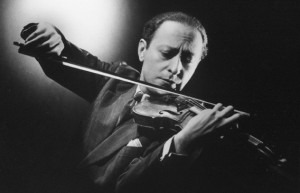
Jascha Heifetz
Jascha Heifetz, born in Vilnius, Lithuania in 1901 started the violin at the tender age of three. By age seven Heifetz made his debut playing Mendelssohn’s Violin Concerto. We are unaccustomed to classical violinists needing a bodyguard, but Heifetz had that mesmerizing magnetism. His distinctive sound, flawless virtuosity, perfect technique, scintillating vibrato and expressive musicality have set an unparalleled standard—“the student of God”.
Jascha Heifetz: God’s Fiddler
Heifetz’ discography is nothing short of astonishing. He commissioned and premiered works including William Walton Concerto, music of Mario Castelnuovo-Tedesco, Miklós Rózsa and Erich Korngold and championed composers Glazounov, Elgar, Prokofiev, Bloch, Strauss and Sibelius. His fanciful transcriptions of encore and orchestral pieces for the violin are popular today.
Jean Sibelius: Belshazzar’s Feast Suite, Op. 51: III. Nocturne (arr. M. Press for violin and piano) (Jascha Heifetz, violin; Brooks Smith, piano)
During the First World War, in April 1919, he performed a benefit concert with pianist Sergei Rachmaninoff earning the astronomical sum of $7,816,000 and he traveled to the front during World War II giving hundreds of concerts for Allied service men and women often in perilous settings.
Violin students at UCLA and the University of Southern California will attest to Heifetz’s intimidating personality and formidable standards. In the 1980s his private atelier in Beverly Hills was restored by The Colburn School in L.A., and it continues to resonate with great talents.
David Oistrakh
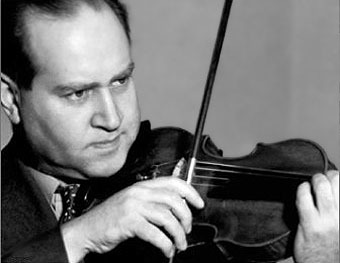
David Oistrakh
Russian violinist, outstanding pedagogue and esteemed conductor David Oistrakh, born in Odessa in 1908, played with virtually every major orchestra in Europe, in Russia and in the U.S. He became fast friends with Shostakovich and Prokofiev. Oistrakh premiered the two Shostakovich concertos and sonata, and Prokofiev’s two sonatas, as well as the Miaskovsky and Khachaturian Concertos. During the World War II battle of Stalingrad, Oistrakh traveled to the front lines and while the city was brutally bombed he performed Tchaikovsky Violin Concerto.
Oistrakh’s large fleshy hands created a gorgeous lush richness, but it was his unique use of the bow that produced the exceptional scope of his sound. His playing appeared effortless on both the violin and viola. Oistrakh was slavishly dedicated to the intentions of the composer rather than virtuosity for its own sake and favored weighty repertoire— Beethoven, Tchaikovsky, Brahms, Sibelius, Glazunov and Shostakovich. An exceptional educator, his pupils include Gidon Kremer and his son Igor with whom he often performed in violin and viola duos. Oistrakh passed away while a guest conducting the Concertgebouw Orchestra.
David Oistrakh and Sviatoslav Richter Perform Brahms’ Violin Sonata No. 3 in D minor, Op. 108
Isaac Stern
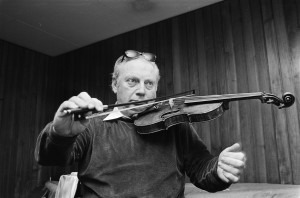
Isaac Stern
Celebrated American violinist Isaac Stern performed all the violin literature and was an active and sought after chamber musician. His trio with Eugene Istomin and Leonard Rose, his recordings of piano quartets with Emanuel Ax, Jamie Laredo and Yo Yo Ma garnered Grammy awards. His discography defies description.
The People’s Republic of China offered Stern and pianist David Golub an invitation to tour China in 1979. The visit resulted in the Oscar winning documentary From Mao to Mozart: Isaac Stern in China. Stern mentored young musicians including cellists Yo Yo Ma, and Jian Wang, and violinists Itzhak Perlman and Pinchas Zuckerman and his efforts saved New York’s celebrated Carnegie Hall from demolition. He appeared in the movie “Music From the Heart” and was awarded the Grammy Lifetime Achievement Award in 1987.
Stern: Music of the Heart movie benefit for Harlem public schools: Isaac Stern, Itzhak Perlman, Mark O’Connor, Midori, John Blake, Ida Kavafian, Anni Kavafian, Roberta Guaspari, Diane Monroe, Karen Briggs, Arnold Steinhardt, Michael Tree
Yehudi Menuhin
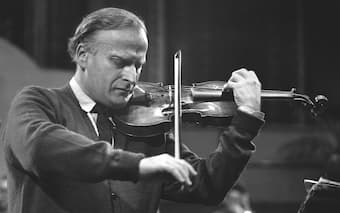
Yehudi Menuhin
Yehudi Menuhin was born to a distinguished and artistic family. He began the violin at the age of four. Exemplifying extraordinary talent, his career catapulted after performing in Berlin in 1922 under the baton of Bruno Walter.
The first Jewish musician to perform in Germany after World War II Menuhin played for Allied soldiers and at the concentration camp Bergen-Belsen after its liberation, accompanied by the English composer Benjamin Britten. Menuhin traveled widely, devoting himself to global and humanitarian causes.
On a tour to India, Menuhin met B.K.S. Iyengar, the eminent yogi, and their association lasted throughout Menuhin’s life. He became a devoted disciple of yoga introducing Iyengar and his methods to artists and musicians.
One of the first internationally renowned musicians to collaborate with world music artists, Menuhin had a long association with sitar player Ravi Shankar. Their first collaboration was the 1966 album West Meets East. Menuhin commissioned Alan Hovhaness’ concerto for violin, sitar and orchestra, Shambala. He also performed frequently with jazz violinist Stéphane Grappelli.
Menuhin has the distinction of having the longest recording contract in history—70 years with EMI. He recorded over 300 works both as a violinist and as a conductor.
Max Bruch: Violin Concerto No. 1 in G Minor, Op. 26 – I. Prelude: Allegro moderato (Yehudi Menuhin, violin; Philharmonia Orchestra; Walter Susskind, cond.)
Itzhak Perlman
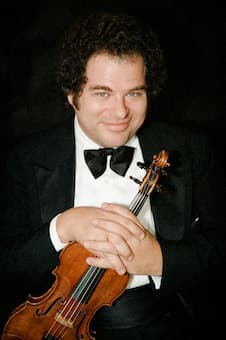
Itzhak Perlman, 1984
Superstar violinist, educator and advocate for individuals with disabilities, Itzhak Perlman has become a remarkable ambassador for classical music. He has played for heads of state, been the recipient of a huge number of awards, including the Presidential Medal of Freedom, and has been a significant force teaching at the Juilliard School and the Perlman Music Program, which he founded with his wife. He has conducted many of the world’s great orchestras and has recorded virtually the entire violin and chamber music repertoire. Perlman gave his first concert at age ten despite having been assailed by polio. When he was thirteen he played live on U.S. television.
Perlman’s many appearances on film include the sound track to Schindler’s List, PBS documentaries Fiddling for the Future, about Mr. Perlman’s work as a teacher and Perlman in Shanghai a memorable visit of the Perlman Music Program to China, which was broadcast throughout China and featured one thousand American and Chinese students. An eloquent speaker, his appearances on a variety of popular television programs have had a profound influence. His brilliant playing, luminous sound and zeal for the arts throughout his distinguished career have been an inspiration to all.
Niccolò Paganini: Moto perpetuo, Op. 11, MS 72 (arr. F. Kreisler) (Itzhak Perlman, violin; Samuel Sanders, piano)
Pinchas Zukerman
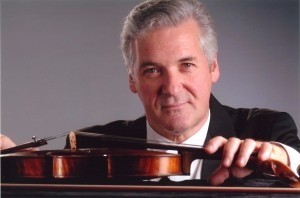
Pinchas Zukerman
Perlman’s lifelong friend Pinchas Zukerman has been a phenomenon in the world of music on both the violin and viola, as a conductor, chamber musician and educator. His remarkably effortless technique, sumptuous sound and unwavering artistic standards continue to amaze. In 1961 when Stern heard Zukerman perform, Stern was so impressed that he decided to guide the course of the young violinist’s education, even becoming his legal guardian.
Zukerman has excelled as the music director of the Saint Paul Chamber Orchestra, the National Arts Center Orchestra of Ottawa, Canada and London’s Royal Philharmonic Orchestra as Principal Guest Conductor. And yet he still has time to dazzle with his recital, concerto and chamber music performances.
Pinchas Zukerman Performs Wieniawski’s Polonaise in D Major
A devoted and innovative pedagogue, Mr. Zukerman chairs the Pinchas Zukerman Performance Program at the Manhattan School of Music, where he has initiated the use of distance-learning technology. His programs have been popular in London, New York, China, Israel and in Ottawa where he established the NAC Institute for Orchestra Studies and the Summer Music Institute for Young Artists, Conductors and Composers. Through free online master classes and webcasts, he communicates his passion to modern day audiences. Listening to Zukerman and Perlman play together is quite a treat!
Perlman and Zukerman Perform Handel-Halvorsen Passacaglia
Anne-Sophie Mutter
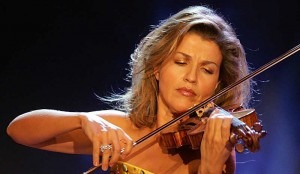
Anne-Sophie Mutter
A protégée of Herbert von Karajan, Anne-Sophie Mutter was invited to play with the Berlin Philharmonic when she was 13 years old, and she hasn’t taken a breath since. Her profound artistry, virtuoso technique and opulent sound mesmerize whether she plays the great standards such as Beethoven or contemporary violin works, which she champions. Among her many world premiere performances of concertos written for her is Witold Lutosławski’s Chain II. She has won three Grammy Awards for “Best Instrumental Soloist Performance with Orchestra” for her recordings of Berg’s Violin Concerto, Rihm’s Gesungene Zeit, Penderecki’s Metamorphosen, Previn’s Violin Concerto and Bernstein’s Serenade. Her recording of the Beethoven Violin Sonatas with her regular duo partner Lambert Orkis also won a Grammy. Mutter’s discography and her performing schedule are astonishing.
Leonard Bernstein: Serenade (London Symphony Orchestra; André Previn, cond.)
Committed to mentoring outstanding young string players, Mutter became the International Chair in Violin Studies at the Royal Academy of Music in London in 1986 and later she formed The Anne-Sophie Mutter Foundation to support the development of gifted musicians.
Mutter has presented benefit concerts for humanitarian relief for the SOS Children’s Villages in Syria and for the Leipzig Refugee Council “Integration through Education” projects. She strongly supports the assimilation of beleaguered refugees. Mutter not only is an outstanding performer, she is a patron of the arts with a social conscience. The numerous prestigious awards, which she has received, attest to her altruism.
Gidon Kremer
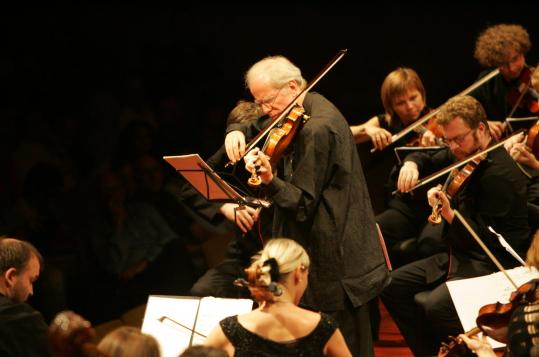
Gidon Kremer © G. Paul Burnett/The New York Times
Karajan famously said in 1976, when Gidon Kremer was finally able to leave the Soviet Union, that he was the greatest violinist in the world. Born in 1947 in Riga Latvia, he came from a family of distinguished string players studying with his grandfather, his father, and then David Oistrakh.
One can consider Kremer a renaissance man. He has mastered and performed virtually all of the standard violin literature. He has been an advocate of twentieth century composers—such as Prokofiev, Shostakovich, Bartók, Piazzolla, Enescu and Berg, and composers of our time, Philip Glass, Arvo Pärt, John Adams, and Alfred Schnittke. Several works have been dedicated to him including Sofia Gubaidulina’s Offertorium and Luigi Nono’s La lontananza nostalgica utopica future.
Kremer formed and conducts the outstanding chamber orchestra Kremerata Baltica. His focus on innovative programming is reflected in 20 recordings with them—albums featuring Pärt and Piazzolla and recently Glenn Gould, in which several contemporary composers based their arrangements on eleven pieces Gould recorded as inspiration for The Art of Instrumentation: Homage to Glenn Gould.
Kremer is daringly virtuosic, and often unconventional, nonetheless he eschews spectacle, exhibitionism and artistic compromises, even withdrawing from performances where, “’stars’ count more than creativity, ratings more than genuine talent.” Kremer, a gifted author, has written several books about his artistic philosophies.
Gidon Kremer Performs Bach’s Chaconne
Ida Haendel
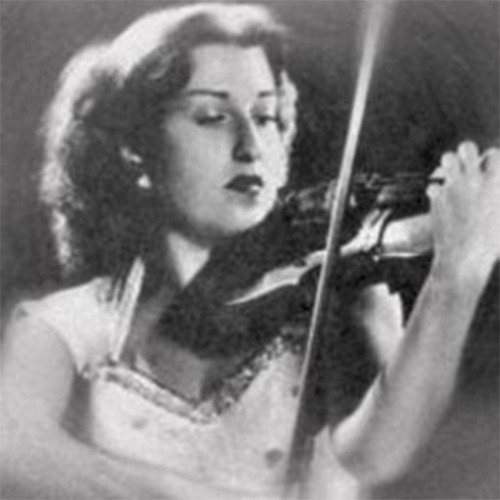
Ida Haendel
Last but not least, Ida Haendel, legendary ‘genius of the violin” gave concerts well into her 80’s, although befitting a woman with big hair, elegant gowns and flashy jewelry, her birthdate is a matter of conjecture—perhaps 1923, or 1928. A mind-boggling prodigy at age 3 winning the Warsaw gold medal age 7, the Polish artist became an Internationally renowned soloist. She studied with George Enescu and Carl Flesch and is known for her glowing sound, shimmering vibrato, compelling emotion, unprecedented ease, and interpretive depth.
Pablo de Sarasate: Zigeunerweisen, Op. 20 – I. Moderato (Ida Haendel, violin; Alfred Holeček, piano)
Haendel is attributed with many “firsts”—in 1948 she performed the first of 60 performances at the Proms in London’s Royal Albert Hall. She became an exclusive Decca recording artist in 1940, one of the first classical artists in the company’s history; she was the first Western soloist invited to China following the Cultural revolution, the first soloist to play with the Israel Philharmonic in 1946; she won first prize in the Henryk Wieniawski International Violin Competition in 1935, and in an unprecedented feature in 2001, the BBC broadcast an entire week of live archival performances of Ida Haendel. Her discography is remarkable and compares with the greatest violinists of today and lucky for us, several documentary films have been made of her life.
For more of the best in classical music, sign up to our E-Newsletter
Ida in her 80s playing several works informally

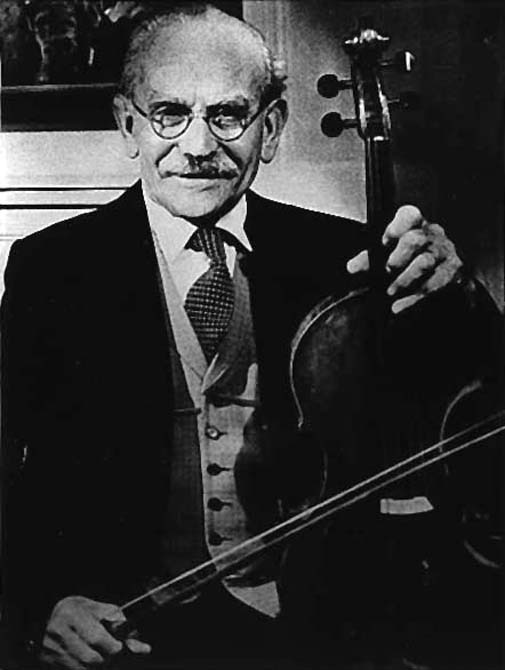
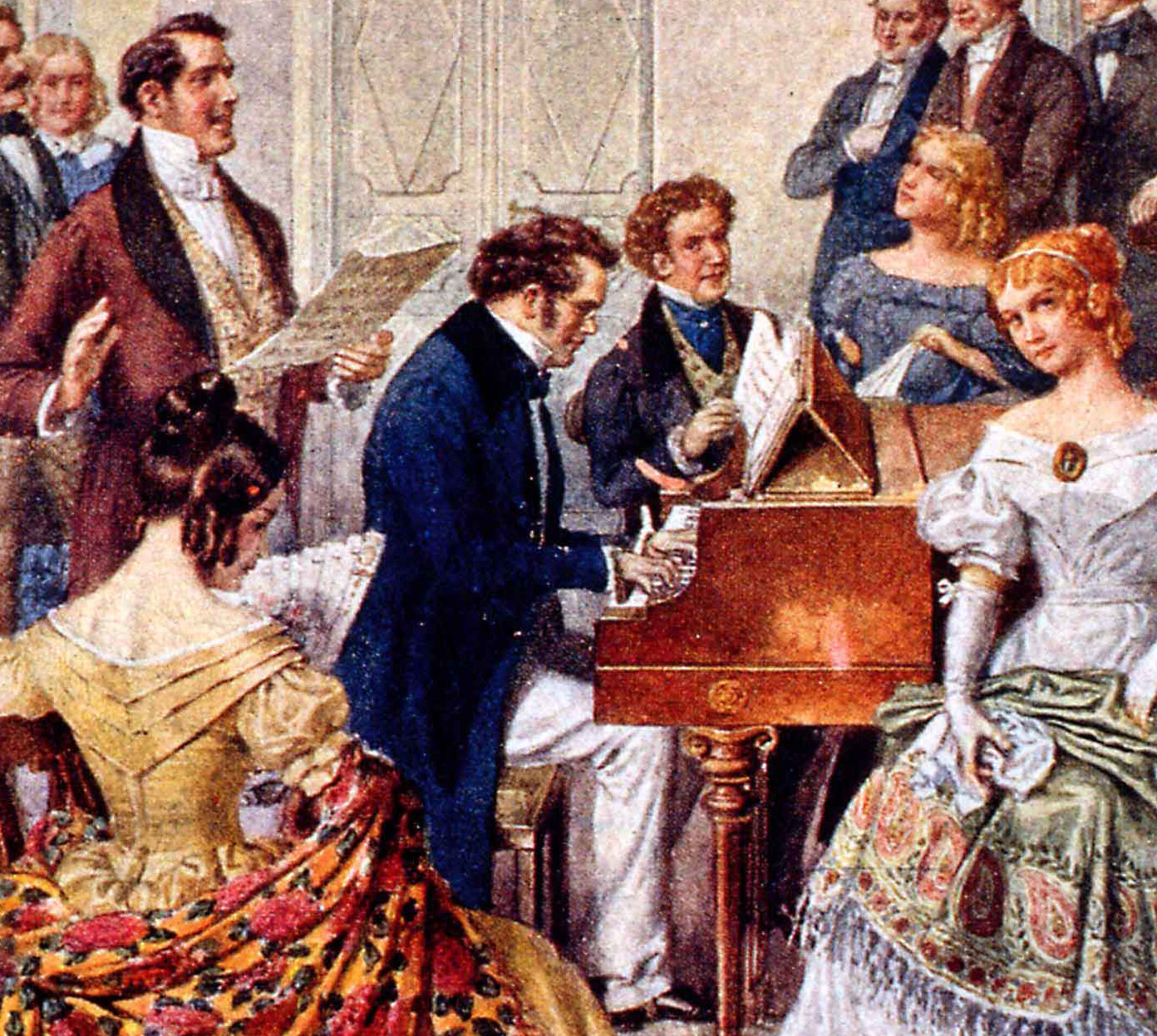
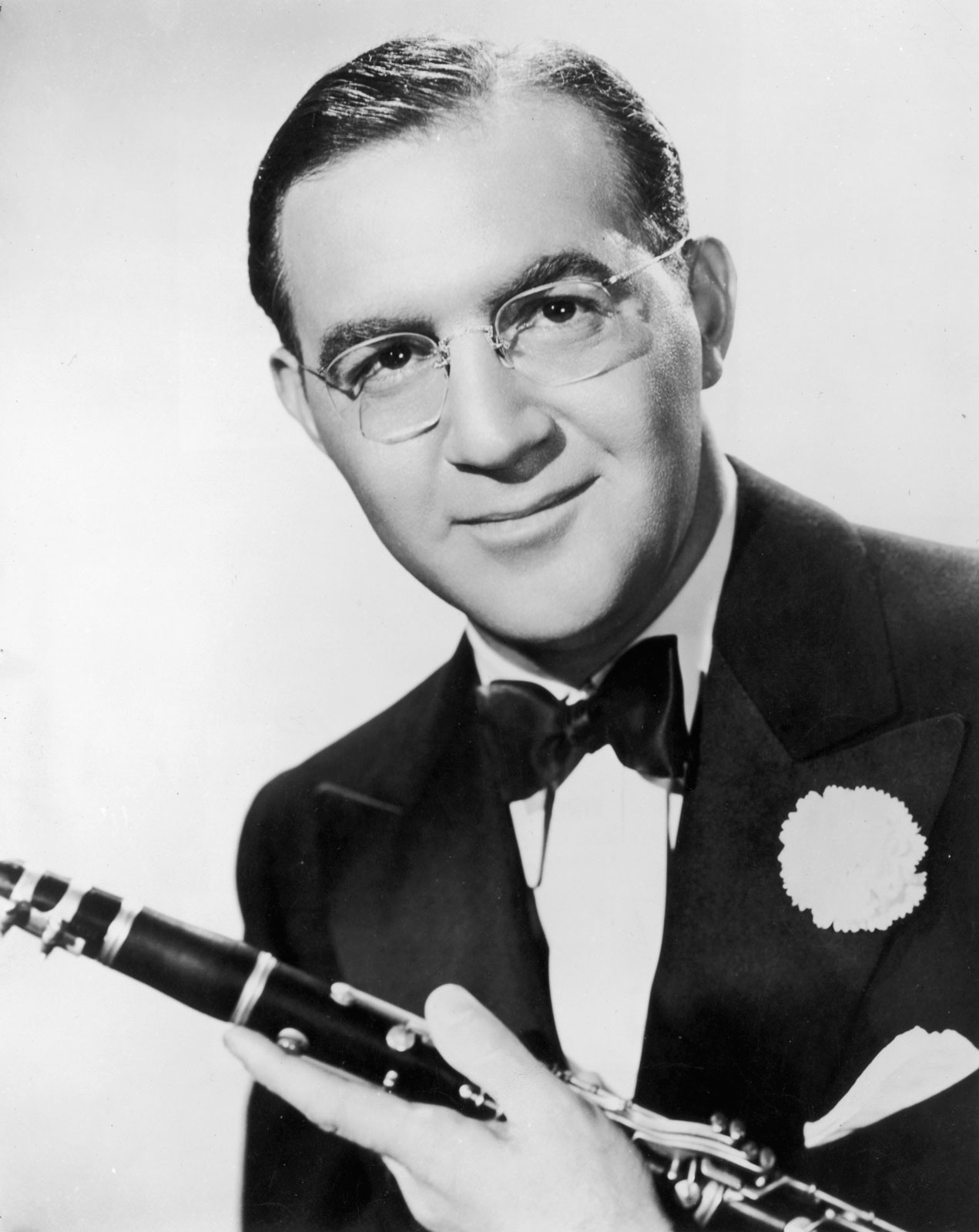
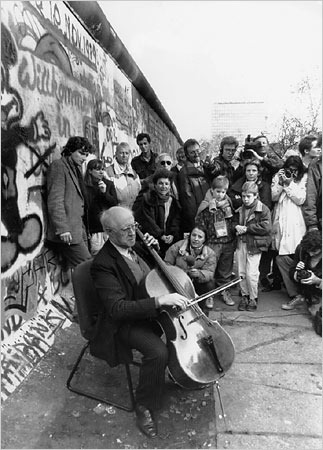
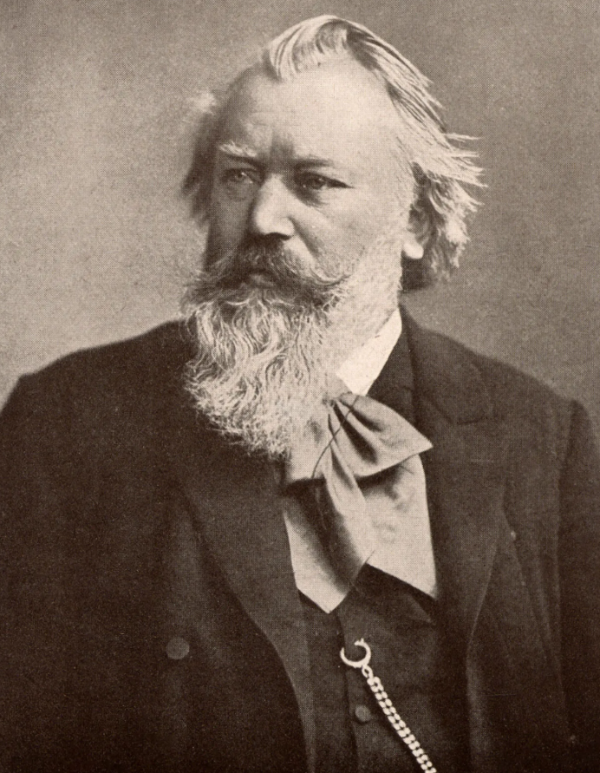
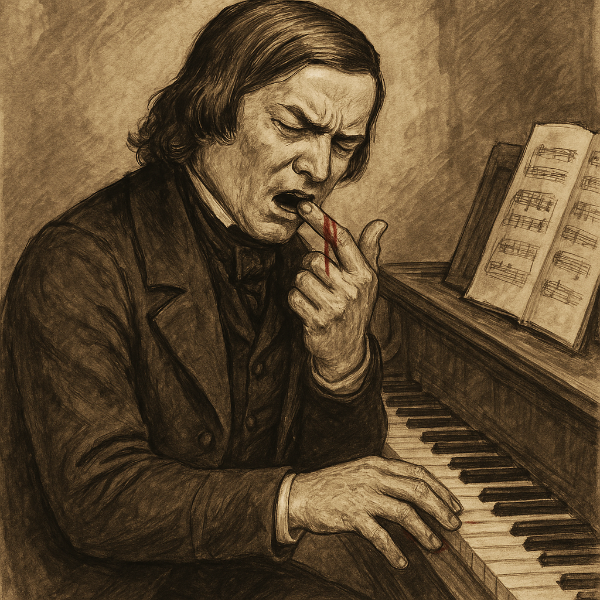
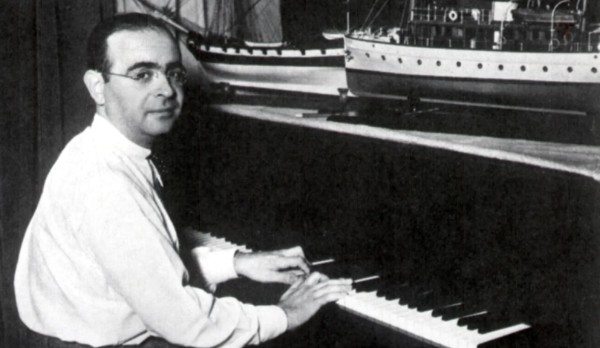
What about Joseph Segeti?
no Henryk Szeryng Serious omission!!